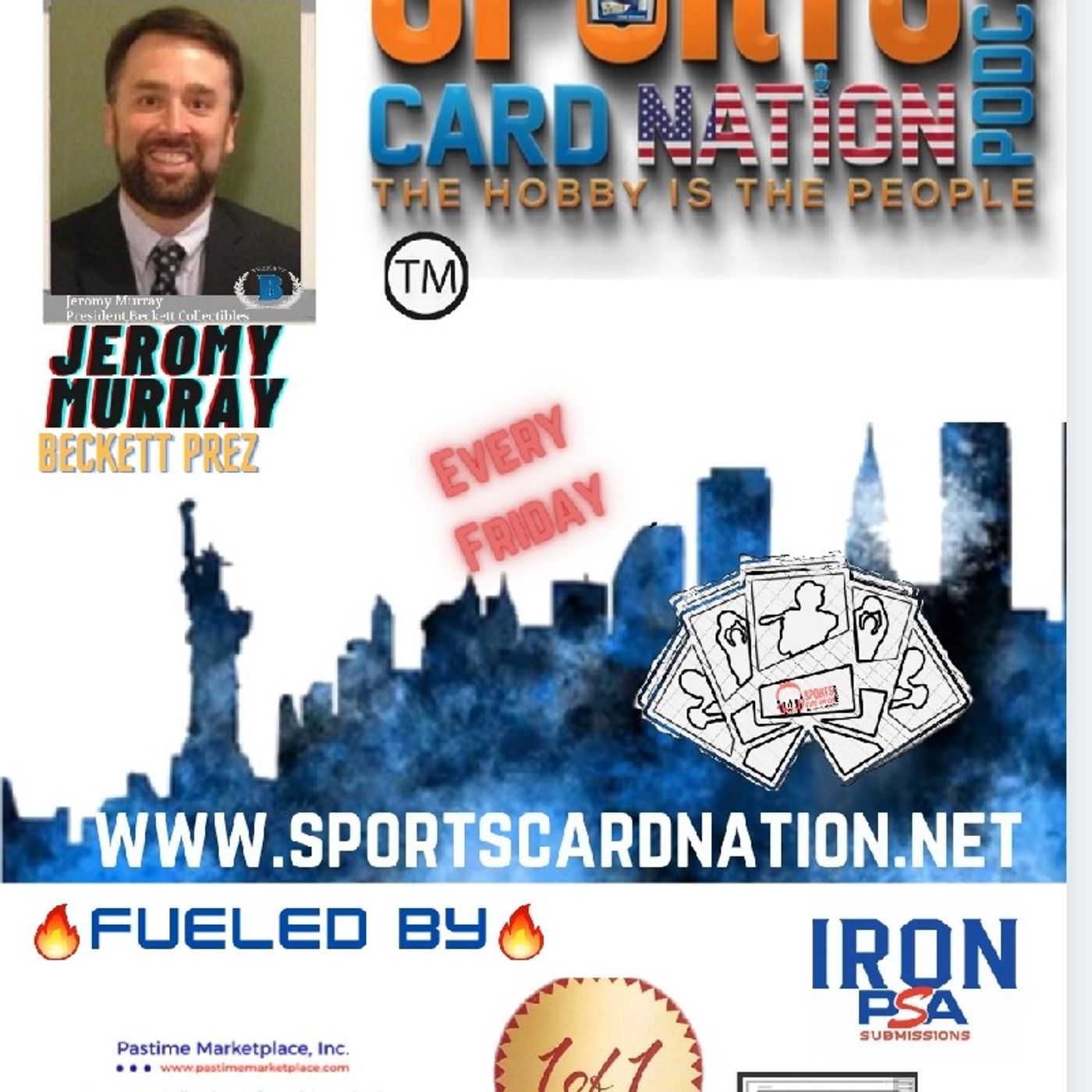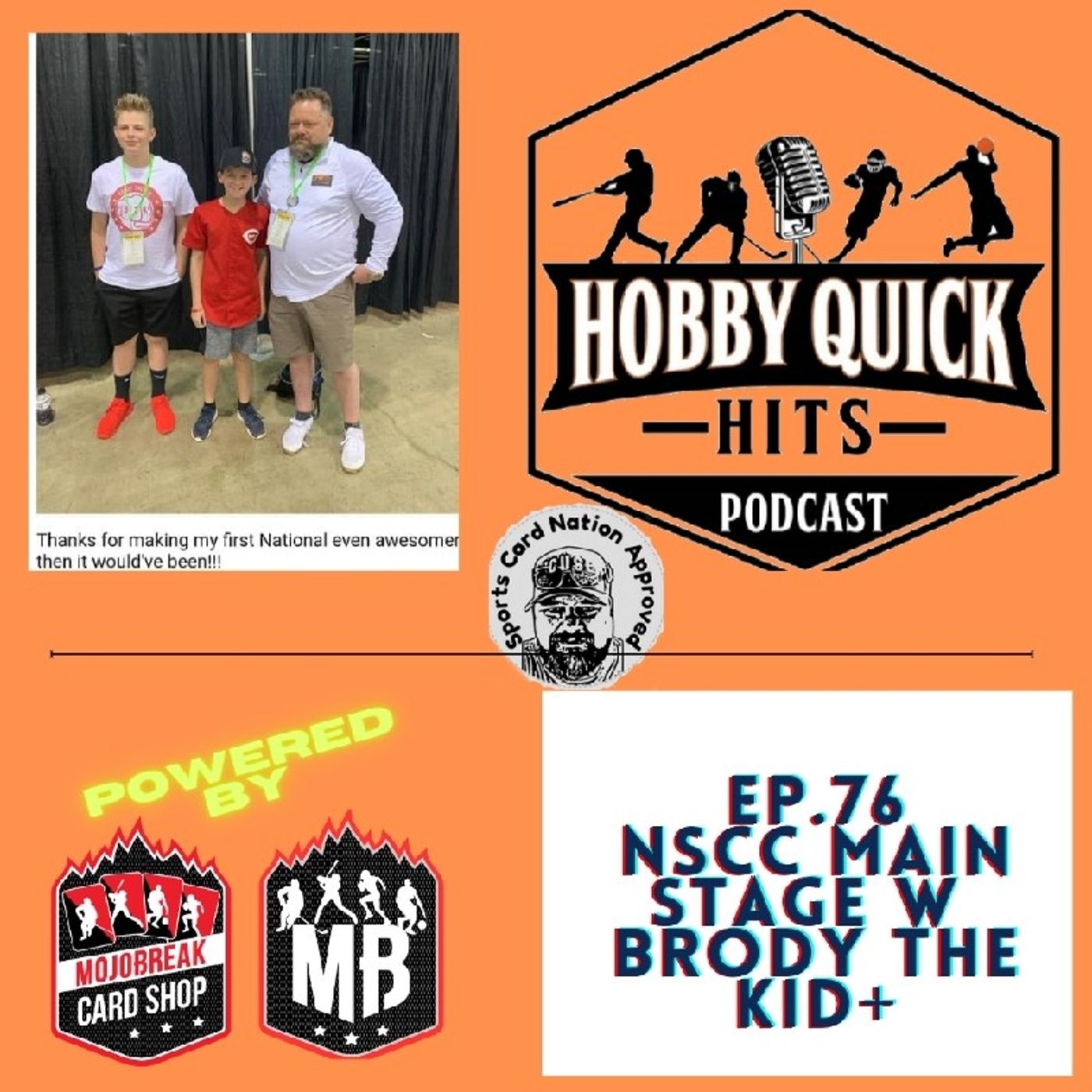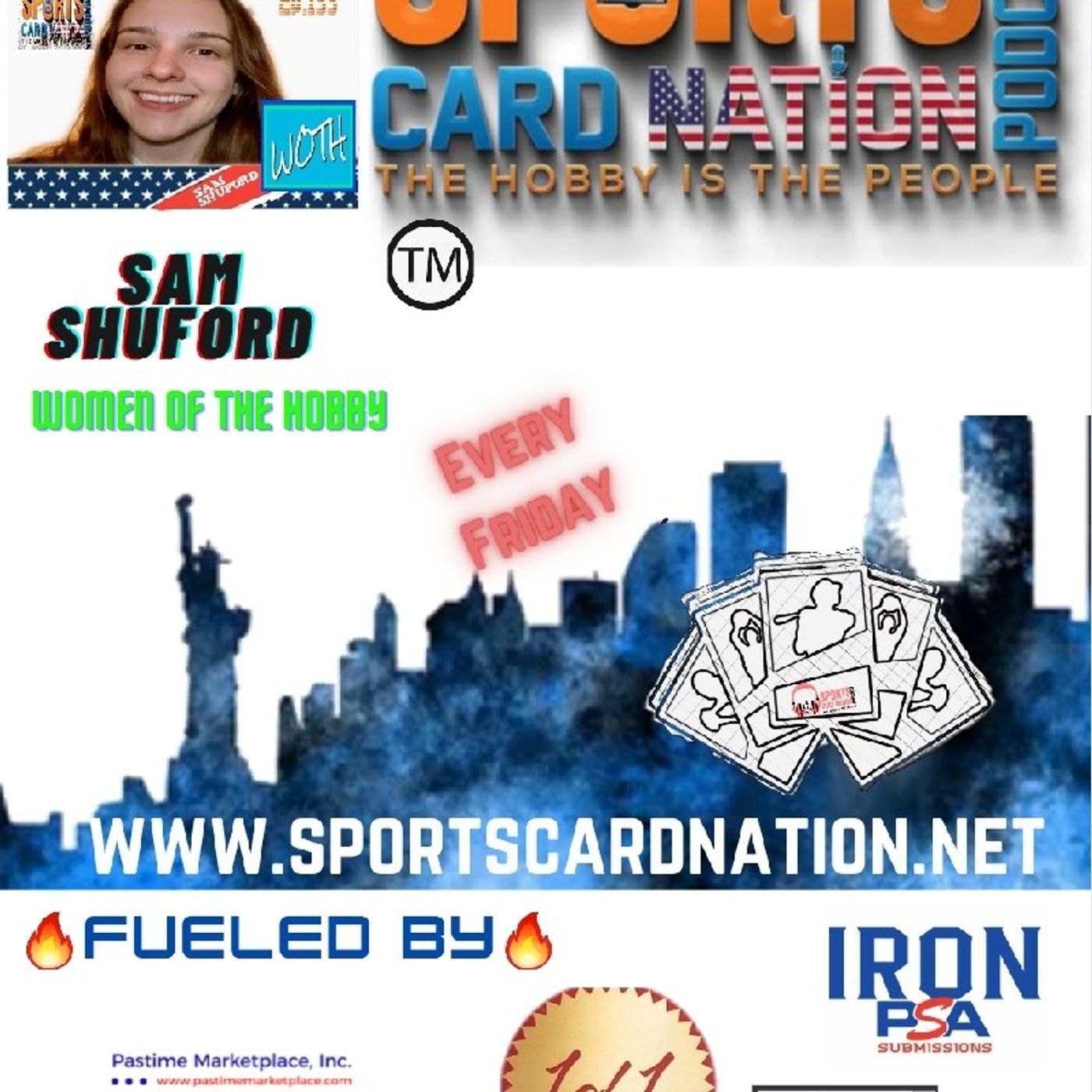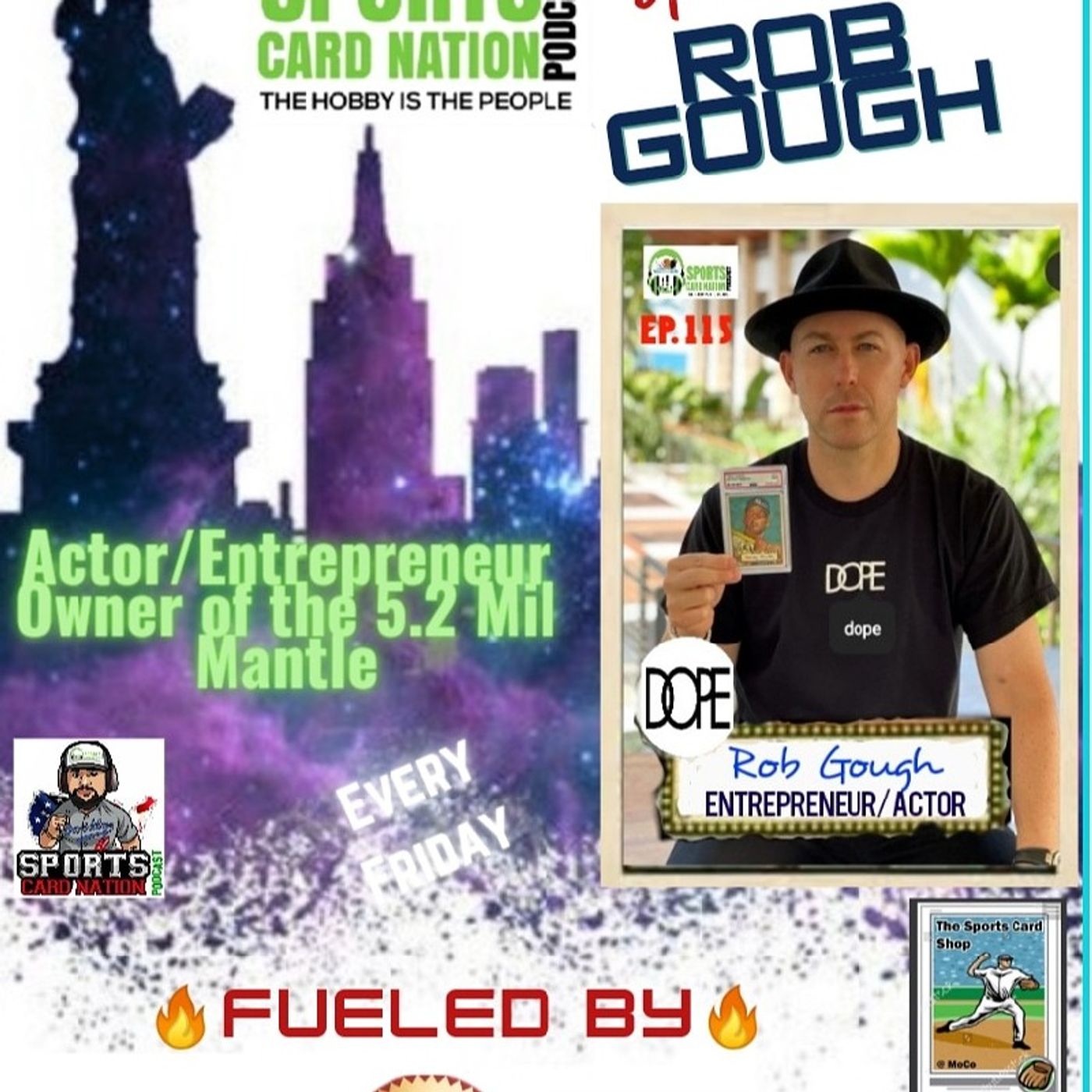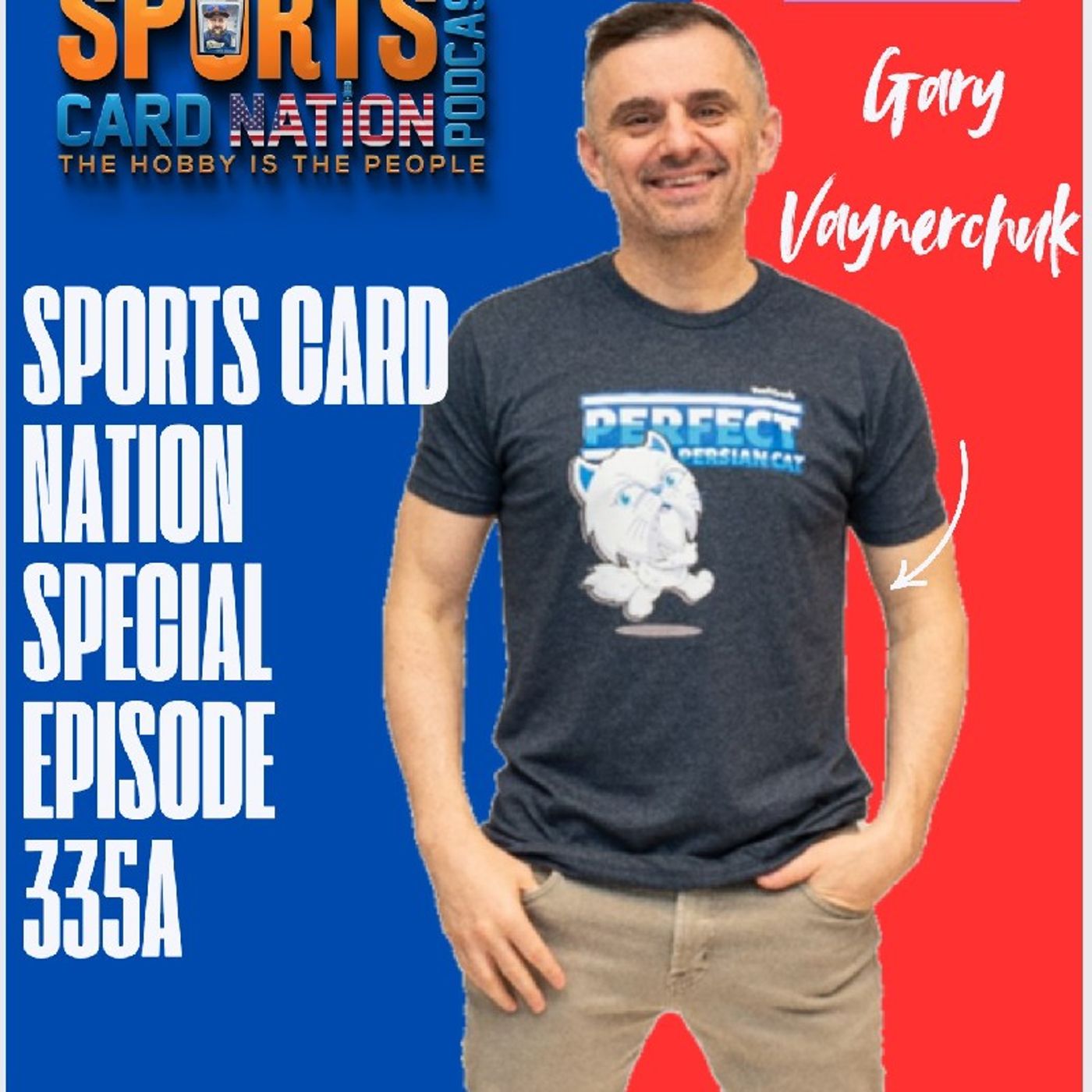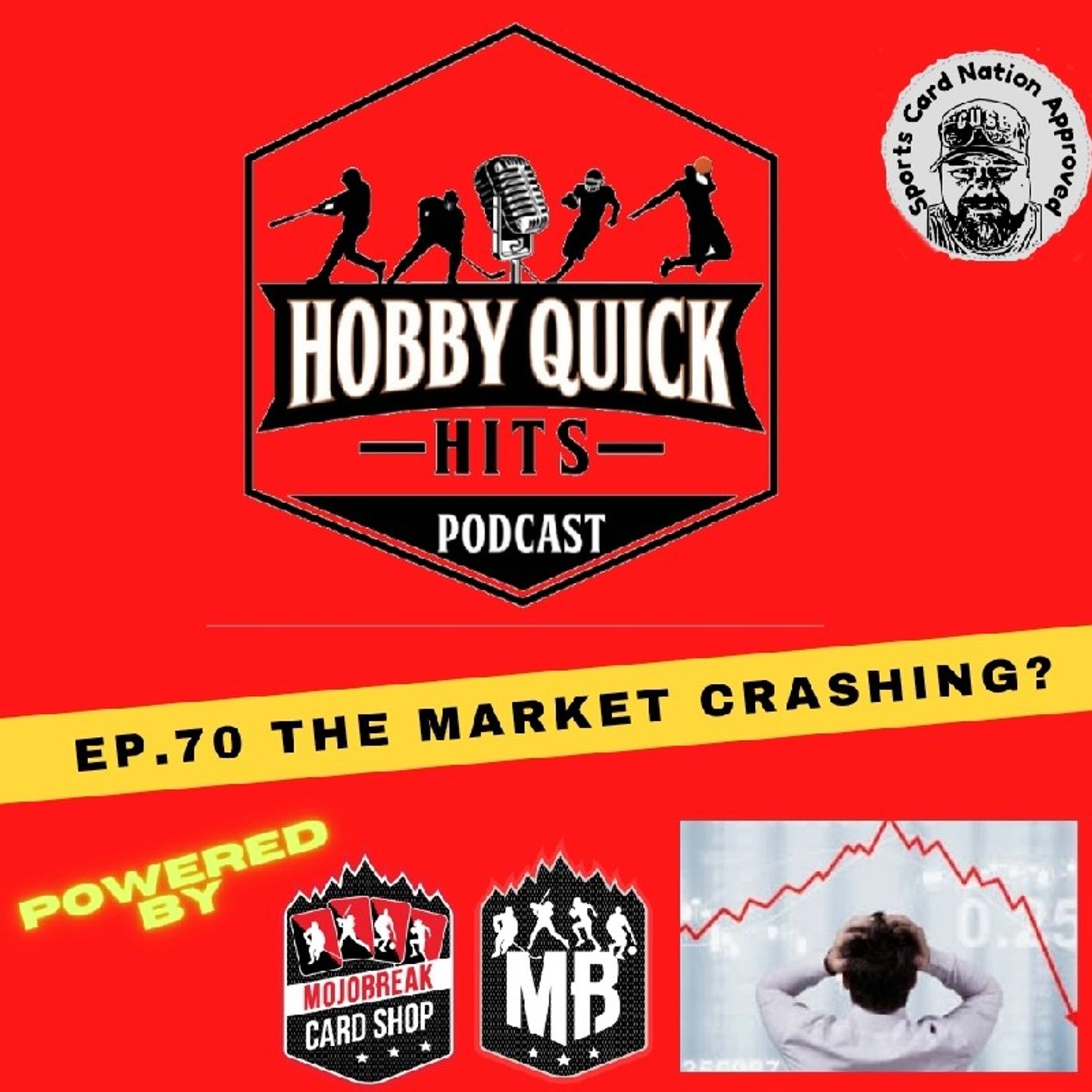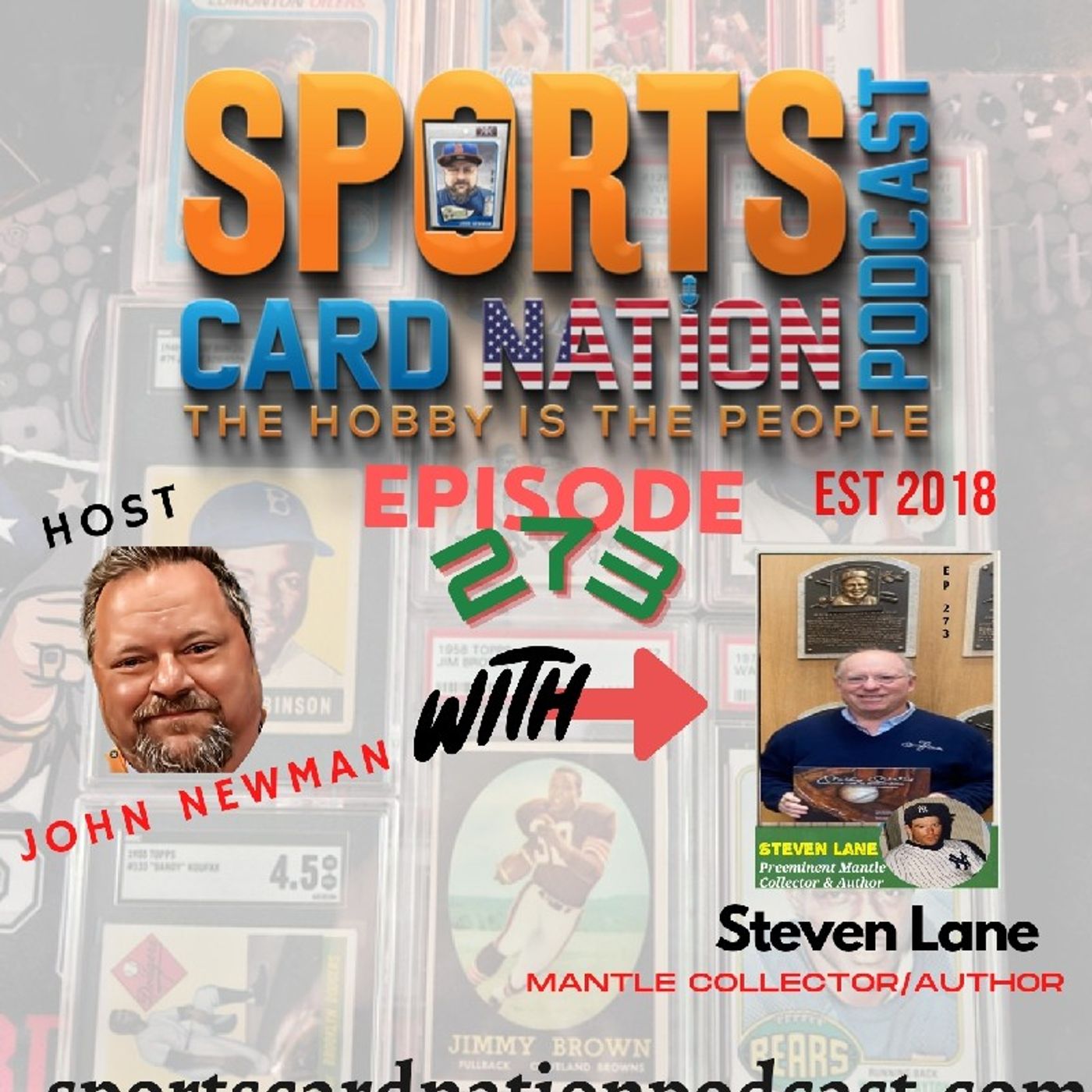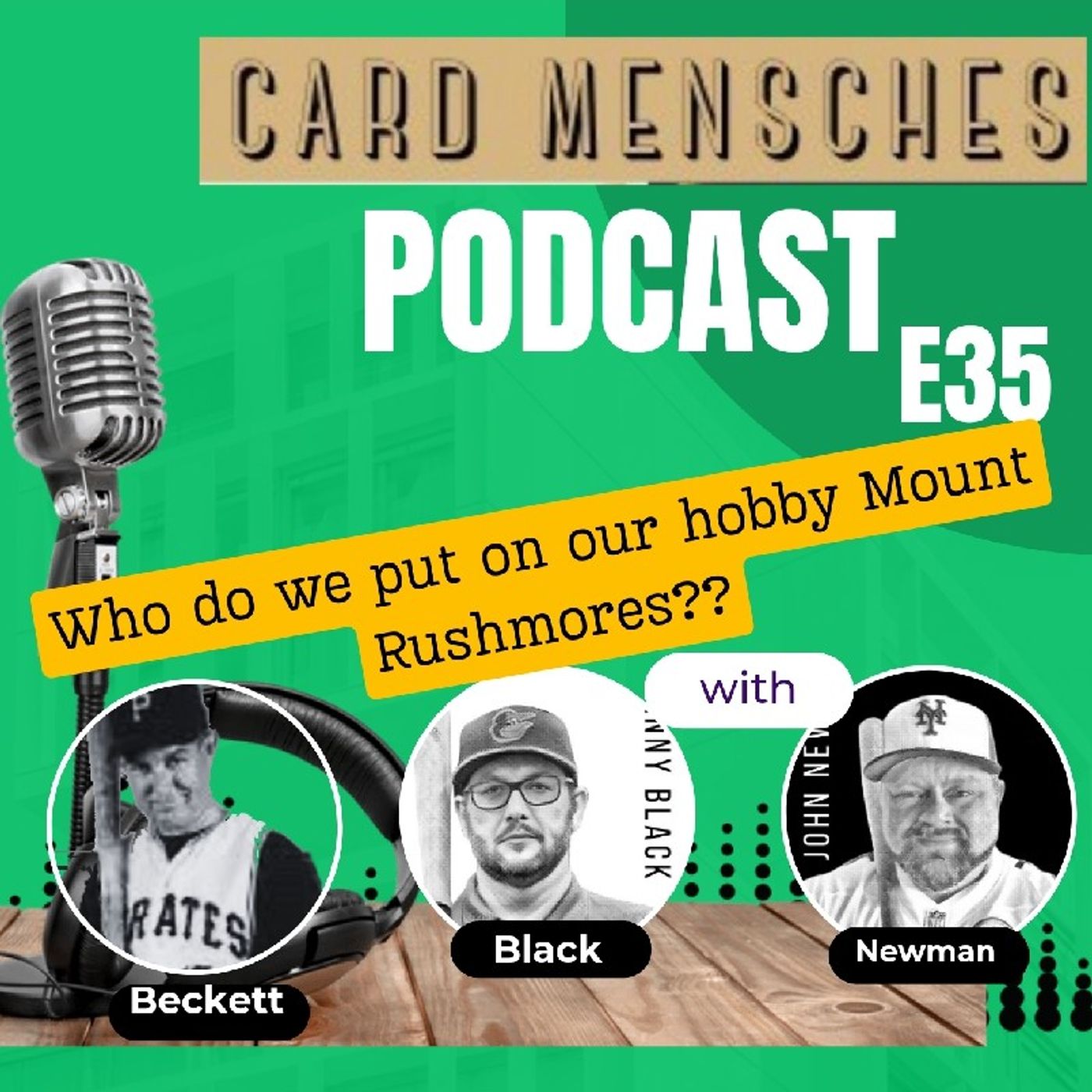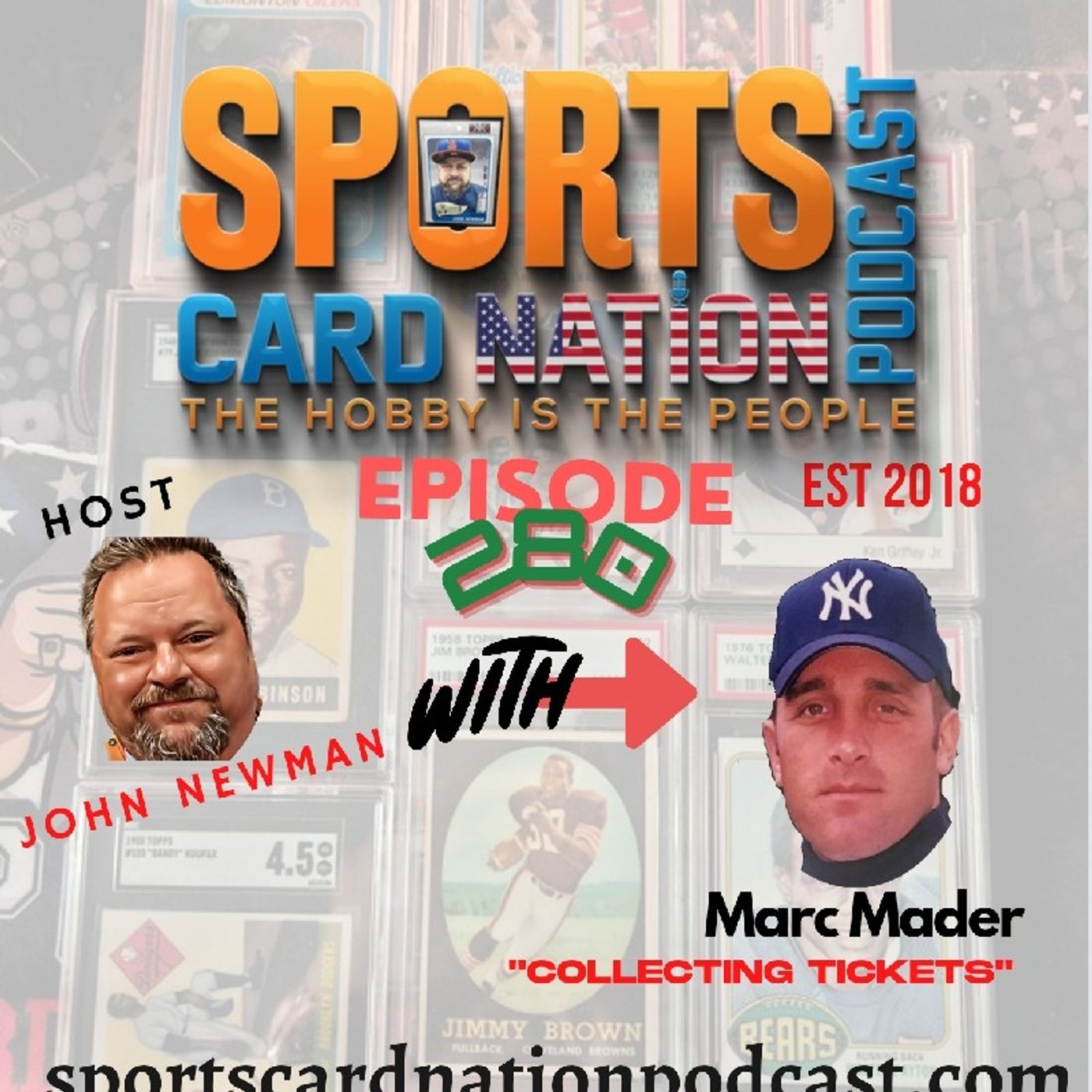Ep.255 w/ Mike Cramer of Pacific Trading Cards Part II
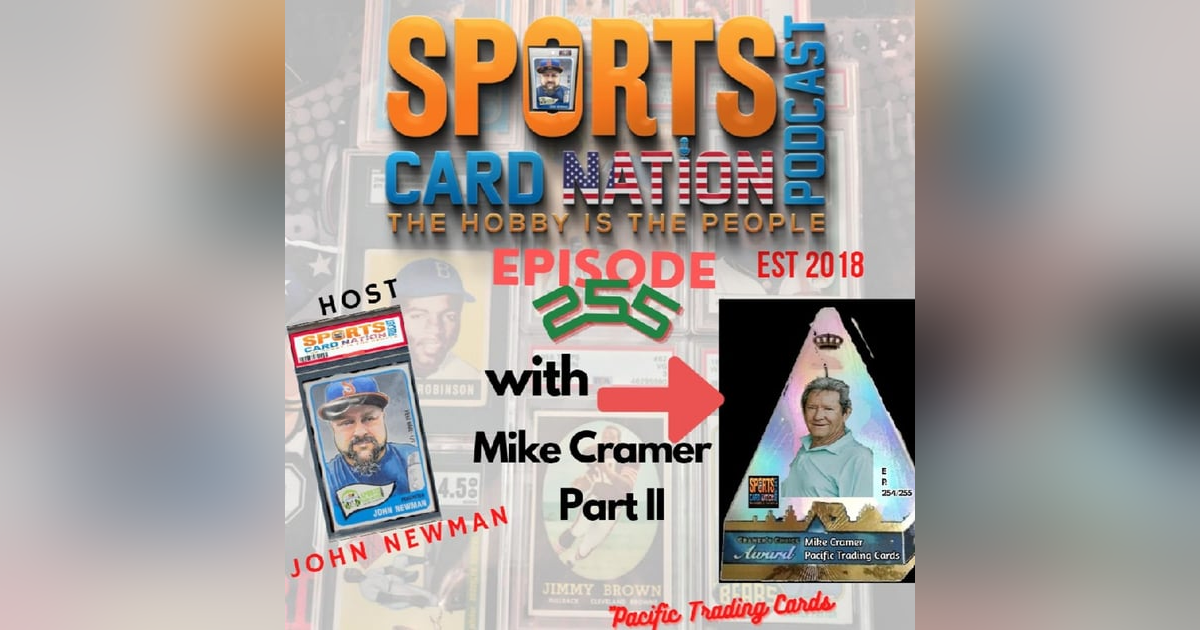
Mike Cramer of Pacific Trading Cards returns for part 2 of our conversation.
Talking Points:
*The Birth of the Prism brand
*Mike's view of the current landscape
*Behind the scenes of Licensing
*CardSupials.. inspiration of "Topps RIP"
*Getting in the trenches as a sports photographer.
Follow us on Social Media:
Website:
https://www.sportscardnationpo...
.com
https://linktr.ee/Sportscardna...
Follow us on Social Media:
Website:
https://www.sportscardnationpo...
.com
https://linktr.ee/Sportscardna...
Become a supporter of this podcast:
https://www.spreaker.com/podcast/sports-card-nation-podcast--4761791/support
.
SPEAKER 1: What is up everybody? Episode 2 55 A K A part two of my conversation with Pacific Cards, Mike Kramer. And again, this was a tremendous honor and privilege to kind of, you know, not kind of to talk to somebody who this was the time period where I was really, you know, he, you know, heavy into hobby between owning the store and traveling and selling and buying cars. This was my error.
SPEAKER 1: I mean, I'm, I'm still doing it, but this was really where as, as people say, they cut their teeth, this is where I cut my teeth. And so, you know, if you would have asked me then, hey, you know, do you ever think you get to talk to, to Mike Kramer Pacific Cards? I, you know, I, maybe if I ran into him at a show or a convention, but, you know, podcasting wasn't around then. And so, I just wanna say it was really cool.
SPEAKER 1: I, I love all my guests but it was really cool talking to Mike about the hobby and some of the stuff I remembered so vividly and, and stuff that he was directly in involved in and, get some of the, you know, the behind the scenes stuff that you didn't know. So this is part two. This is the concluding episode of that conversation. I hope you enjoy it as much as I did. Are you a new.
SPEAKER 2: Sports cars collector or someone returning to the hobby? Maybe you're just looking for a friendly trustworthy hobby community to hang out with and enjoy collecting Midwest Box Springs has been bringing collectors together for many years with affordable bras, helpful grades and a discord group packed with generous people who genuinely care about the hobby and other collectors.
SPEAKER 2: Check out the breaks at Midwest box breaks dot com. Our goal is to bring you as much value as possible. Also find us on Twitter at Midwest Box Springs.
SPEAKER 1: Also remember to check out Midwest box brakes, marketplace for brakes packs and single cards from over 300 trusted sellers apply to sell today at ISO dot GG forward slash Midwest box breaks.
SPEAKER 3: For more than 30 years. Robert Edward auctions has been the nation's premier auction house specializing in sports memorabilia and trading cards with significant experience and expertise in all major sport, non sport and Americana collectibles.
SPEAKER 3: Re A has helped clients achieve record breaking prices for their items and has done so with a reputation for integrity and transparency by actively partnering with collectors and enthusiasts throughout the entire process. Re A has created the hobby's most trusted forum for selling high quality collectibles, go to Robert Edward auctions dot com for more information on how to buy or sell in their next auction.
SPEAKER 1: We, we know Prism today, Mike, the, the brand Prism obviously Panini has it at the moment, we, we know the landscape is sort of changing there and I wanna get your, your there.
SPEAKER 1: But, you know, you Pacific brought Prism to, to the light of day and I remember when Prism came out and it was just so different than anything that had been done before, you know, a lot of times you look at a, a new design and you can see sort of elements of, of things in the past and then new ones sort of added prism on its own, really was sort of its own creation.
SPEAKER 1: And, you know, it, it had a life of its own. Did you know, when you came up with the, with the cut, did you know that it was gonna be to that level and then stand the test of time as it has? Now in, in Panini's at least for the moment with in under Panini brand.
SPEAKER 4: I, I did when when we came up with a, a brand, it was first used in 93 in football cards. And I knew at that moment this was going to be good stuff and I had to school my sales force on the fact that we, we could put one card in a pack and it would sell for, I think the retail was 2 49.
SPEAKER 4: I, I don't remember exactly but, that I knew that that car would be, that collectible and would would, wow, that many collectors that, that, that would sell. And it did. And the Prison brand became the flagship brand, you as, as they say of Pacific and was, was always our number one selling brand and we did sell that brand to Panini or playoff.
SPEAKER 4: And then they, they sold the brands to Panini and Panini carried that brand on. And I think it's one of their flagship brands also. And so when people nowadays collect the Prison cards, I feel pretty good about that because they're collecting our brand and and maybe it doesn't say Pacific but, but the Prison was our brand and we're the ones who came up with that idea.
SPEAKER 4: And so that's another testament to us that, that our brands lived on. And that was one of the reasons I sold Pacific was so that our brands could live on.
SPEAKER 1: And I opened plenty of those one pack Pacific products I just loved the look, they were so different, it was a different experience opening the pack and pulling those kind of cards out. And you know, those were also my dealer day So even looking through my inventory, I always hope, like did, did one sneak, like I didn't sell one or did I someone miss one?
SPEAKER 1: And I, you know, they're, they're all gone and that's a testament to the design and their desirability that even the ones I didn't hold back. And I just kind of put in my boxes or out in inventory. People love it.
SPEAKER 1: And, you know, it's made, I think Panini, if, if they, if they were honest, I think Panini would tell you it's their flagship now, as well. It's what they hang their hat on and what collectors sort of clamor for. And it was because you brought it to the light of day and, and, and be it.
SPEAKER 1: And, I think that's, i important and I think a good percentage of people put the, you know, put two and two together, but I think there's a portion to, you know, maybe someone listening to this podcast might say, hey, I didn't realize that this was the, I thought Panini did this yet.
SPEAKER 1: Now, I just found out and they can go back and, and, and find those cards and they're out there, a little more expensive than they used to be, but that's, that's par for the course. And again, another testament to the desirability and the people searching and, and trying to add those to their collections, and inventories.
SPEAKER 1: And I had plenty at one time and I don't know, I probably, if I had to, I could find one but I have a lot less because just people see them and, and, and scoop them up, when they can, because it, it, the aesthetic of the card and it brings them back, in some cases it brings it back to a time, where we, we, we got started, in some cases or just a nostalgic.
SPEAKER 1: Hey, I remember, this is really when I really ramped up, my hobby years and, you know, I think again, that's a testament to, you know, your ingenuity and, and wherewithal to, to come up with, these designs. And that was a design.
SPEAKER 1: Like I said, I'm gonna, you know, I'Ll pat you on the back for, that was a design that really kind of changed the, the landscape because it was, it was completely different than anything, done before for those that, how difficult was that to, to produce, in, in, you know, for, you know, we, we get the, the, the easy part to open a pack, pull it, look at it, hold it.
SPEAKER 1: But as the, the manufacturer and producer of it, you know, I would guess it's a little trickier than, your, your average base card if you will.
SPEAKER 4: It, it is, it, it was, much more involved as far as designing it because we had to, we had to print the, the player's image on the card and the other graphics that were actually printed in ink. Then, and then we, we had to, when we designed the card, we had to outline the play with a, with a color. So we had a little bit of room for bleed. And then, and then we had to get the foil down perfectly on every single card.
SPEAKER 4: So they, so the player would still come out, the image would come out. And, being it was our first go at it, it was, it was a lot of trial and error and a lot of, prep planning to get it down. Right. And, we pulled it off a while I thought, and I, I think collectors, also agree those cards are getting very old now, those that we did back, in the early days in, in 93.
SPEAKER 4: And so I can see why, how they'd be drying up in the market. And I, I looked on ebay, to see if I could find any boxes of 93 Pacific Football Prism and by, I didn't see any. So they must be drying up out there pretty good.
SPEAKER 1: Yeah, drying up and, and a lot of it, Mike is probably due to just the demand, right? Not even what's out there is just being consumed. People want it like, hey, I can still get this. So, I'm sure there's some boxes on, on someone's shelves that's saying, hey, I'm, I'm just, I'm holding on to this.
SPEAKER 1: This brings back a lot of great memories and, you know, I, I don't wanna not have it and you know, the temptations probably there to, to open it up, but they're probably like, hey, I don't know if I can get another box if IO maybe if I get another box open one of the two, but keep, you know, keep one for, for posterity.
SPEAKER 1: And, yeah, I think it's, I think the fact that it's living on, through, like you said, playoff then, then Panini, I think it's their, what? They hang their hat on, at the moment.
SPEAKER 1: Yeah. No, I, I think it's just the truth. I mean, speaking of that, you know, the landscape is gonna change here as we, as fanatics has, has gotten, the three Licensing, for the three of the four major sports, they're trying to get it a couple of years earlier than their, their schedule too. That's a whole show, in itself. I mean, you were in a time when there was multiple brands and, and, and multilevels of, of competition.
SPEAKER 1: You know, my fear and I, and I'm a Brooklyn New York kid. So tops, I know tops are sentimental to you. You, you pointed that out in the book for me growing up in Brooklyn. It also is.
SPEAKER 1: And when that news broke a, as I've said many times on the show it was sort of a, a gut check, a gut punch and, and, and now we see that, you know, ultimately their goal is to control is as much of the market, as they can. And I get it, it's business. It's, it's, it's kind of par for the course. But as a collector and, and, and, and a hobbyist, you know, kind of your thoughts.
SPEAKER 1: I like, I, I, I'Ll speak for myself here. Mike is, I just don't feel when someone controls 75% of a, a business, you know, someone will say, well, it's not a monopoly and I, and it isn't in the, in the definition of it, but it's pretty close when we think about on hobby, on the hobby level.
SPEAKER 1: And I just worry about the consumers, right, that they're gonna be the ones maybe taking decisions, on the chin and, and, and it becomes too much of a business, you know, I, and I also think competition makes the best, products.
SPEAKER 1: You know, one of the reasons Pacific came up with those designs besides a smart guy named Mike. Mike Kramer was, you had to, because you were a smaller company, company company, at least at first you had to think, hey, how do we get notice?
SPEAKER 1: What can we do better than what's being done already to, to put more eyes on what we're doing here when there's one company that sort of controls the market.
SPEAKER 1: I think that that can sometimes, not everyone's different but that sometimes can go by the wayside and, and that would be one of, of my fears as, as someone who, who ran a company when there was multiple companies and seeing kind of where the, the direction Abby is going now, kind of your thoughts on, on that as someone who's seen it where, you know, competition breeds the best, ingenuity if you will.
SPEAKER 4: I, I agree the competition, gives the consumer, more choices and keeps the envelope pushing forward, as far as designs and, and ingenuity. And II, I disagree with the fact that, one company can be out there. Just, just one making baseball, it just isn't good for the consumer. And, and what, what happens if something happens to that company?
SPEAKER 4: I'Ll give you a case in point of, back in my day, there was a company named Starter who was making all of the, jackets and, and member, shirts and, clothing line and they had the exclusive for that and they went under and, you know, during that time, you know, even my, my hobby retail stores that I had was selling, Starter brands and we didn't have any other, fallback, you know, until another company stepped up and started making, more clothes lines.
SPEAKER 4: And, they'll always, I say in my book, there'll always be manufacturers of trading cards because it demands out there. But, who it's gonna be? And how long can somebody keep, making cards if they, if they market falls a little bit, can they keep up because they have to, pay such a big royalties or something?
SPEAKER 4: You know, it's not, it's not a good consumer market, only having one manufacturer.
SPEAKER 4: And so, and my, and my biggest, fear in the whole thing is the consumers, get nothing new, nothing different because there's no, there's no desire or need for the, for the manufacturer to do anything like that, because they have kept the market, they can make whatever they want and if you're going to collect cards, you gotta collect what they put out there and they're, and they don't come up with anything new.
SPEAKER 4: And so there's a big downside. I, I'm very surprised that, nobody stepped up and challenged that with a, with a monopoly type of lawsuit like flair did back in the, in the eighties.
SPEAKER 4: And even before then, and, and the judge ruled that they could have, there had to be more than one, manufacturer of, of baseball cards. And so maybe that's coming, maybe, maybe not. But, we'll see time will tell. And so it's a little bit different market out there.
SPEAKER 4: I have also heard that, that, there, there's the distributors that distribute cards, to the hobby stores and they're being, weaned out by Tops and, and Tops is going directly. And so, you know, there goes there and Tops is a big chunk of the market without, no, no doubt about that.
SPEAKER 4: And so is that, is that, the way the market's going too? So, you know, it's all, it's all up in the air right now. And I guess, I can just say this, I'm sure glad I'm not in love.
SPEAKER 1: I hear you. I hear you.
SPEAKER 4: And I've been through the lawsuit and, and I know what they're, what Panini is doing now and because I've been there, it's, it's a good time not to be for me. Yeah.
SPEAKER 1: Speaking of that, I was gonna ask you that it's a good segue to ask this question. It was on my short list of questions. I'm more of a conversationalist based on what we're talking about.
SPEAKER 1: But how much do you, you, you don't have to mention names or co but do, does a, does a company a, do you get, sometimes someone will reach out and say, hey, Mike, we're, we're thinking about this or what do you think of this or do you ever does your expert, you know, your experience, does anyone ever lean on that from, a company or a manufacturer.
SPEAKER 4: Early after I, sold and got out. I had a, I had a couple of questions that from people that asked me a few things.
SPEAKER 4: Recently I haven't been, out there in the, in the trading card world to where anybody knew I existed. And so the answer is no, I don't hear from anybody. I, I know the lawsuits that we had are, available online and I'm sure they reference those because they are, public and out there online. But, but no, not, not in the recent years.
SPEAKER 1: Yeah. And, and not, not to wave a banner for litigation.
SPEAKER 1: But, like you said too, I'm hoping at some point maybe someone tries to lay down some ground work so we can have competition in the market and multiple, you know, manufacturers making, especially baseball, kind of the, you know, one of the number one, hobby sports and, and, you know, the one thing when I heard the length of the deals that these, you know, the players union or the, the players association or the leagues and the, you know, 20 years, that's a long time to me and, and, and I get your thoughts on this too, Mike when I heard the length of the agree, you know, the agreements, 20 years, you know, signing on 20 years with someone who hasn't made cards yet, as a brand new, you know, manufacturer that seemed like a long time to sort of hit your wagon to, not that fanatics is new, but they're new to producing, trading cards on that level.
SPEAKER 1: At least we'll word it nicely like that. And to give someone that new in the space 20 years, sort of carte blanche.
SPEAKER 1: I know there's ways to potentially get out of, a 20 year contract, but they're not there. It can get sticky and it's not ideal.
SPEAKER 1: It just to me 20 year, you know, and, and, and like you, you point out in the book so, you know, for a lot of cases, it was year to year for you. You were what, you know, you were, you were one year at a time like, oh, I hope we can do it again, this year and you, sometimes you had to wait almost to like the midnight hour to find out we're getting it or, you know, or we're not.
SPEAKER 1: And a lot of times that communications not even verbal could be like you, you, you talked about getting a letter that, hey, you can't, we're, we're going into, you know, you can't make them anymore and very, very informal and, and in different, you know, but 20 years that, to me that just seems a long time to give anyone sort of a, a contract for it.
SPEAKER 1: I don't even care. I wouldn't give, you know, tops 20 years bef before they were acquired by fanatics a five or 10. Seems to me, a 10 is long if you ask me, I think you go in fiveyear increments and then you revisit it in year four or five.
SPEAKER 1: Whether you were extending that, that agreement or partnership 20 years just seems very excessive to me. Your, your kind of thought to someone who's dealt with those kind of, contracts and agreements and never on a 20 year. I'm assuming you never had a 20 year deal with, with anybody.
SPEAKER 4: No, I, I didn't know their deal was 20 years. Most of our license, agreements were three years.
SPEAKER 4: One of them was year to year but most of them like baseball and football and hockey were three year license and then renewed after three years.
SPEAKER 4: 20 years.
SPEAKER 4: That's a long time. You know, if you think about that, almost all the players playing in major league baseball right now won't be around in 20 years and so all the players will change out, and 20 years is, is a long time. I didn't know that, but that seems, seems pretty, excessive to me, but I, I'm not involved anymore in the, in the manufacturing side, so I, I didn't pay attention to that.
SPEAKER 1: Yeah, I agree. It's just that it seemed like a long, do 10, 10 years seems a long time yet. It's, it's twice that and, and like you said, a lot can happen, in a 20 year cycle, business wise, obviously made a great point that the players that are playing today, even the best ones, who have long careers, chances are, unless they're a rookie this year.
SPEAKER 1: And even in those cases, their, their most, their careers will probably be, wrapped up, at that time. It's just a little, you know, I just don't see why a need is to do a, at, you know, 20 year deal. Like, you know, when we get married, right, we say to till death do us part. That's almost the, the hobby, equivalent of, of, of, of marriage vows, right?
SPEAKER 1: And, just put a five or 10 year, to me contract that way you can, you, I mean, if you want to, if it gets to 20 years, like for tops headed for, for, you know, but it was never like, hey, you're gonna do it for seven years. They just had to keep getting their contract renewed. I think that's the way it should be. It keeps the owners too on the manufacturer.
SPEAKER 1: Like, hey, we want to keep this contract. I'm sure you thought that right? As a, hey, I wanna keep new, producing these cards. I wanna do a good job. I wanna make the players happy. The, the league happy. There are consumers that are purchasing these cards happy. We all, we all happy. We get to keep doing what we love to do.
SPEAKER 1: I think when you give someone 20 years, you're like, it's almost too much of a free pass. Like, hey, we, we, we're good for the next 20 years now. You still gotta live up to agreements and all that. I get that. But it's just too long. I've said that on the show, on more than one occasion, like, it's just too long a deal, but not, not to harp on that.
SPEAKER 6: You are listening to the Sports Car Nation podcast.
SPEAKER 6: Be right back after this break.
SPEAKER 3: For nearly 50 years. Sports Collectors Digest has been the voice of the hobby. Bringing you comprehensive coverage of the sports collectible industry from industry news, auction results, market analysis and in depth stories about collectors and their collections. Sports collectors digest has everything you need to know about the hobby.
SPEAKER 3: S CD is also your leading source for listings of sports collectible dealers, card shops, card shows and the latest from the industry's top companies to check out all the latest news or to subscribe to the hobby's oldest magazine. Visit sports collectors digest dot com or call 1 808 29, 55 61.
SPEAKER 1: We, batch one more card II I pulled out because this was, you know, I love stuff that never really, been done before.
SPEAKER 1: And I remember these and I still have, I found this one too.
SPEAKER 1: And again, there, you got the, the foil, the, and again it's first Martin.
SPEAKER 1: All right. And then I don't know if you know it, but I, I'Ll, I'Ll turn it over to the back. Right. And these are the car t like how cool that is. And, and the one thing I love about it, you know, I used to call, I remember back in the day I used to call them the kangaroo card cause it was like the pouch with the little, with the little card.
SPEAKER 1: And I think I've heard other people call him. Well, the one thing is so this is Curtis Martin and then this is Marcus Allen and this is not just a picture what, which it is, but this is a full fed card.
SPEAKER 1: I mean, there's, there's dialogue and stuff on the back, it's, it's numb and then it fits, it fits right in there and that's not going anywhere that, that now that Marcus Allen is in there and this was something that really was, but I can't remember a time seeing that before and I just thought it was cool in a sense you're getting two cards in one with these and they, and they, and they, these to be different guys as, as well.
SPEAKER 1: Talk about the concept of, of these where it came up with and you know, we talk about the difficulty of making the present cards with, with the technology. Now you got like a card inside a card. How did you get, how did you, you get these, done that card?
SPEAKER 4: And the reason nobody's making that type of, of card now is it was laborsome and expensive to make, but it was an idea that we came up with and, and like most things that we came up with, if we had a great idea, we ran with it and though, we call them card sup because of the, of the Kangaroo Marsupials where they have a, had a pouch and, and a card in a pouch.
SPEAKER 4: But all of those small cards, we put a different player in, in each card. So we didn't have the same card, same back card in the in like Marcus Allen, we put a different one. So people would have to collect them and, and try to find the one that matches up and the graphics for the back of the card matched up to the little card. And all of those little cards were hand inserted before they were patched.
SPEAKER 5: And so I was gonna ask.
SPEAKER 1: You about that. That's what I thought. I'm like, I don't know what kind of machine can put a little card inside. I mean, and it's got to be difficult even if it existed that technology, maybe today, even today's standards, it might be tricky to even get that. I think it.
SPEAKER 4: Would insert them and we had AAA lot of employee and, that was one of the, nightmares of my, of my packaging engineer. We gotta do this. We didn't two or three years straight. And, he was like, oh, no, this takes so much time and labor. So we ran a third shift, stuff and car soup and then got him ready for the packaging line. But we wanted to do it and we thought it was a great idea and we.
SPEAKER 5: Ran with it.
SPEAKER 1: It's, it's very cool. I'm sure you had a couple of employees be like, hey, boss, you're not doing marsupials this year. Are you, what's going on? Right. And like, you know, trying to give you elbow, right. No Carss and this year, right? But it was, it, it was unlike anything that was done before.
SPEAKER 1: And again, this is what, and here's what I'Ll say if you know anything about today's brand, you know, CS has the thing, they call the rip card, which I, I, I'm assuming you might be familiar with. It is a little part of it. Yeah. So it's, it's a card and they put another card, inside it, but it's sealed, it's sealed and there's two preparations and you know, it'll say on the bottom of the card.
SPEAKER 1: So you got your regular card and it'll say to rip or not to the rip and whoever has the card has a choice. I, I can rip it and see what the little card is so I can keep this card intact.
SPEAKER 1: And not every, not every little card inside the tops card is a guaranteed like you can't lose like it's a chance. It's like scratching a lottery ticket. So lottery tickets gonna win you some money and some are gonna be, non winners. And so the top and when, when the rip cards first came out, I'm not gonna lie. I said, man, those are Pacific Car sups.
SPEAKER 1: It's just the tops, modern day version of it. That's my point is a lot of the stuff you did, Mike that was different at the time is being sort of reinvented. But the wheel, you created the wheel, people are just doing different takes on the, on the wheel and I think that's AAA Testament to you and, and your company, right?
SPEAKER 1: That and, and we're talking 2030 years ago, some of this stuff and yet today it lives on in maybe a different form. But we know where the idea. It's the first thing I thought when I saw a top strip card for the first time, I'm like it's card. So it's card sup 022.0 And.
SPEAKER 4: The way they're making them is much easier than what we did cause I could see how that could be done.
SPEAKER 1: Yeah, that machine and seals it and then it seals with the perfect on to the next rather than putting them in, individually, by hand and, and they're a little bigger card if you see them. The card that's inside the card is, is speaking of the, the, the 206 sizes, it's about that size, inside your, your 2.5 by 3.5 card.
SPEAKER 1: They even made some metal ones and people were taking like, a magnet and trying to figure out without ripping it open. Did I get the special metal card? And I think cops did something to sort of combat that sort of c but, you know, everyone's trying to stay one step ahead of everybody else. The other thing in reading your book is we're, we're winding down here too.
SPEAKER 1: Is, you know, that, that I, I learned about you is you did a lot of the photographing yourself of, of the shots that it would eventually make their way onto the cards, that we love you were hands on even shooting on the athletes and, and like you said, you weren't necessarily a trained for photographer per se but you, you hone your craft by, by doing it.
SPEAKER 1: Talk a little bit about, obviously, I gotta think, I don't want to speak for you, but probably being AAA fan of sports to begin with, there was a way to get closer to the action, but you also had a job to do to get cause you, you watch the game too much, you're missing the shot, right?
SPEAKER 1: So kind of talk about the decision, to be one of the photographers. And did you ever catch yourself like, hey, I'm supposed to be taking some shots here and I'm getting enamored by the, the game situation here.
SPEAKER 4: Well, I, I shot my, pictures back in 1975 and six and seven for those, minor league. And so I had a little bit of photo gray background, but, I realized in, in 1993 that I could, shoot NFL and major league baseball, spring training and games, because we were making cards and I wanted to do it. And, I, I had one of our photographers, we had, we had about 20 or 30 photographers shooting for us.
SPEAKER 4: I was just one of the guys and, I, I went out, bought the equipment, Canon equipment and put myself on the sideline. The first game I shot was in, at Candlestick in San Francisco. And, I learned how to do it right at that game. And it, and, I shot maybe one roll of film, before that. And, I enjoyed it. It was, it was exhilarating, it was a rush.
SPEAKER 4: I, I, my results were real good and back then we were shooting slides, there was no, digital and so it was a real learning curve on how to shoot slide film, which produced the best image. Nowadays.
SPEAKER 4: I think almost anybody can pick up a camera and shoot digital because you can tell what you get just by looking at your screen. But back then you didn't see the film until you until you got it developed. And so I, I enjoyed it. I never got caught up in the game itself.
SPEAKER 4: I just got, focused on the player that I was gonna shoot that during that sequence.
SPEAKER 4: And, and the reason I didn't, never got caught up in the game itself, was you could get killed doing that if you weren't paying attention, some, some player could, put a knee right in your chest or head and that happened at a few games where guys got knocked over and, and, we hauled off and, and so I, I real, I shot football for almost 10 straight years, nearly every week.
SPEAKER 4: And, my wife went with, we went with me a few times to some games and, and I had gave her equipment and she shot some headshots for me over on the sidelines.
SPEAKER 4: She didn't like getting down on the, on the line. It was, 22 scary, I guess for her. She, she shot a few but she got away from that. But, you know, she still got a huge head shots with the back of the card. So she did a lot of that.
SPEAKER 4: I shot baseball. I probably shot several 100 games, baseball games.
SPEAKER 4: Real fun. A lot less exhilarating than, than shooting football or hockey. I shot in a NHL hockey also. And that's, taking your life in your, and when you get down between the penalty box on the ice.
SPEAKER 4: But, I got good at it and good enough to where I would spend my weekend, weekend shooting pictures and sometimes during the week if I was shooting, if I was traveling somewhere and, took my gear with me, I had the meetings and then I go to, go to a game either during the day or later. And so enjoyed that quite a bit.
SPEAKER 4: And, I kept, nearly, almost all of the photographs that, Pacific used on trading cards. Al almost all of the photographs that we actually used from about 94 or five or six. I can't remember through 2005 or four. Actually.
SPEAKER 4: I, they're in my library and, and so I, I, when, when we, sold nobody wanted the pictures.
SPEAKER 4: I did because number one, I was a collector and I didn't want him to go in the dumpster. We sold the outtake that nobody that weren't used on cards.
SPEAKER 4: And, and so I have all those in my collection.
SPEAKER 1: Well, it's part of the history. It, it's part of, of what made, Pacific Pacific and, and, you know, in reading even what you shooting, it just told me like you cared enough about the product to, to be right on the front lines when you didn't have to be, you could have sat at home or didn't want, you know, been somewhere else and, and, you're like, hey, I, I wanna get, I wanna get this shot.
SPEAKER 1: I gotta, I'Ll let you answer this, but I gotta think hockey is probably the, the toughest one to shoot just at the, the pace of play and that they're constantly moving back and forth, at a moment's notice with a, with a change of puck possession and that sort.
SPEAKER 4: It's so fast and they so fast and, and they, when, when a player puts on, skates, he's a, he's giant. And, if a guy, you know, if they're skating right by you and they got a stick going and, and they, you know, I had to, I had to pull my camera back several times when I was down on the ice. Then nowadays they make you wear a helmet. But back when I shot, that, that wasn't the case.
SPEAKER 1: Did you have to sign a waiver?
SPEAKER 4: I don't remember that. No. But, yeah, they, they probably should have it signed a waiver. There was one period on the ice and one period shooting through the, hole in the glass and then one period from the mezzanine.
SPEAKER 4: So, the mezzanine period was a little more, relaxing and not so much, hectic but, shooting hockey was fun. I, I enjoyed it, as well, much as I shot. Football and baseball was fun. But, but baseball is a slower game and you can get your shots pretty easily.
SPEAKER 4: Whereas in hockey you're, if, back then if Mario Lemieux stepped on the ice for his, for his shift, you had the number one, find him, out there on the ice and then hopefully nobody skates in front of you and blurred you out and, you know, and then fire away in hockey, you could only fire one shot and then the, Strobes had to recycle and so the AAA lot harder to shoot.
SPEAKER 4: But, more rewarding you ended up getting, getting good shots.
SPEAKER 1: Yeah. And, you know, one thing as we wind down, I, I wanted to touch on it because we're talking about stuff that really wasn't done before. You guys also were the first ones to put, bobbleheads, in, in a product, you know, we know bobbleheads today are collectible, in their own.
SPEAKER 1: Right? I have a few, around my, my studio, here they're just always cool and, and you did it where they were kind of one per box and, and like you said, you only have, you know, the one card in the 75 Phoenix Giants set. You never made a, a Pacific.
SPEAKER 1: But you, there is a, a Mike Kramer Bobblehead that was included in, in that run and doing my, doing some research. It's, it's not a common one. Like they're hard, they're hard to find.
SPEAKER 1: Just kind of, you know, as, as we wrap it up here to talk about putting bobbleheads in the product and, and, you know, you even had a, a problem where you had a manufactured, a little bit of a communication issue where you, I think that's one of the reasons you're, you're actually in the set itself as well. So kinda, I'Ll let it's your story. I'm just sort of setting it up. But, but go ahead.
SPEAKER 4: Yeah, that story is in the book. The, the interesting thing about the book and I only got this printed copy last week is, is they put, use my doll as a picture on the back and I hadn't seen it.
SPEAKER 4: Until I actually got the book, I hadn't seen the back cover, but we, we were making Mike Cory doll.
SPEAKER 4: He played, I blink for, he played for Edmonton. And, and we were making, I think we had 12 different and the manufacturer of the dolls in China said if you make one more, you get a, you can almost make it for free because we use enough material and you get a discount.
SPEAKER 4: So we said, oh, let's do us do me and we had, we had come up with the idea that we would in insert my doll and some of the boxes of heads up and with the doll with my doll, you got a coupon that said you can get a complete set of the dolls, if you mail in this coupon and, courtesy of Mike Kramer, president of Pacific Trading Cards.
SPEAKER 4: And that idea actually worked out really well because whoever got my doll was pretty happy because they were able to get a whole set. Whereas if it, no, most people couldn't buy 12 different boxes of, heads up and, and get a set of the dolls.
SPEAKER 4: And so that worked out real well for us and we made them in, for hockey and for football and they were inserted in, in hobby boxes of heads up and something we tried and, and it worked out good for us and it was kind of fun.
SPEAKER 1: Yeah. And, and another item in the innovation column that no one else did. And I don't think it's been done. I don't even think it's been done since. To my knowledge.
SPEAKER 1: I know a lot of times they have, like Bobble giveaway nights at, like, a stadium or the actual sporting event itself but to, to be, to be incorporated inside an actual product, I don't, I haven't seen it being repeated to my knowledge, yet but, maybe someone will do it and when, if, if, and when it happens again, Mike again, you still started it.
SPEAKER 1: All right. It all comes back, to you, in Pacific. And I think that's, a testament to how outside the box and creative you were ahead of, ahead of the hobby times. And, you know, some people might have thought you were crazy.
SPEAKER 1: But, crazy genius. I like to say, and, you know, I think some of the, I think some of those folks, whether they admit to saying it at the time or not probably would be singing a different tune, nowadays, like, like you said, and, and, kind of starting a lot of stuff we see, today and, you know, I wanted to definitely, as someone who, who, you know, was in the hobby at the time and knew sort of what that meant to the hobby.
SPEAKER 1: I wanted to definitely, this is a, a privilege and an honor getting to talk to the, the man himself and, and you, and I appreciate you, making, making some time.
SPEAKER 1: I highly recommend, and I'm gonna let you give out where people can find the book, purchase it and read it. It's a great read if you especially and, and I don't care if you're someone like me, Mike that's been in the hobby a while. It's a great read.
SPEAKER 1: But even if you're, even if you're new to the hobby because that the stuff you did is so important to what we have now, I think you and even newer hobbyists, and maybe even more so because they don't know where I, I did have some background already and you just filled in a, a ton of blanks for those that maybe don't know the history in the same vein. I think they'll, they'll even find it even potentially more interesting.
SPEAKER 1: And like I said, we're, we can't get here without going there first and, and doing that. And so, I think that, you know, that importance can't be over, overemphasized. So, thank you for, for that. Thank you for, for sharing some of that on, with us today.
SPEAKER 1: Give out anything you want to share websites where that people can purchase the book and, and all that good stuff.
SPEAKER 4: The book, the book is out now on and available on Amazon, Barnes And Noble.
SPEAKER 4: It's also available in the Kindle version of Amazon and Barnes And Noble, because of demand from collectors. I set up my website to sell the book and off my website.
SPEAKER 4: I'Ll, I, I say that I'Ll sign the book and, send it to him, a collector directly and I've gotten a tremendous amount of orders off my website, for the book that, assigned book. And that site is, www dot united empire miniatures dot com. And, it's a site that I, sell some figures that I make on and, I put it on there and it's the number one sell on my site.
SPEAKER 4: Even after having that site for about 10 years, this book overtook all my miniatures as far as number one sales. And so that's WW dot united empire miniatures dot com where you can buy a, a signed book. And, and, the manufacturer mcfarland or the pub of the book also sells the book on their site.
SPEAKER 4: And so it's out there and available.
SPEAKER 5: All right.
SPEAKER 1: And I'Ll make sure Mike will get those, into the show notes as well. So even if you didn't catch it here in the audio version, go to the show notes and, I'Ll have it linked there. So one way or the other, you, you'll be able to find it. And again, it's a great read. A great look at an important part of, of hobby history.
SPEAKER 1: And if you like where we are today or even like where we were, then, it's a great look behind the scenes, to, to how we got to where we are today and how important that stuff was then and still still today. So I appreciate you giving us some time, Mike. Thank you.
SPEAKER 4: You're welcome and thanks for have me on.
SPEAKER 1: All right, that concludes our second part of the Mike Kramer interview. Let me know what you think about us doing kind of these two part interviews to make the, the episodes, you know, at least a shorter length for the week. Good, bad and different. Let us know, rather than do one long, you know, hour, 45 minute two hour episode.
SPEAKER 1: I, I broke them up into two parts as we will be in the next two weeks too as we interview and talk with, David Spinrad rated rabbi or another great guy. And another great conversation that went a little over time that we're gonna break up, into the next two weeks. But really enjoyed talking with Mike, a great guy.
SPEAKER 1: Really, I don't think it's enough credit for what innovation and things he brought to the hobby and, and, and in the conversation, of talking to him, you know, got to know him even better. And, really glad I had the opportunity to have my, sports carnation. All right. It's time for our hobby is the people announcer of the week and then some closing thoughts before we wrap it up.
SPEAKER 7: Time for our hobby is the people announcer of the week.
SPEAKER 8: Hey, guys, this is Dylan from YouTube double D vintage baseball cards reminding you that the hobby is the people.
SPEAKER 7: If you'd like to be the hobby is the people announcer of the week, do a WAV or MP3 file and send it to sports card nation PC at gmail dot com.
SPEAKER 9: That's a wrap for this week. Huge. Thanks to you, the listeners out there because without you, there is no ice. If you like the show, we truly appreciate positive reviews. Big ups to our great guests who drive the show and our awesome sponsors who make it all possible.
SPEAKER 9: Sports card nation will be back next week. But don't forget to catch either hobby quick hits or card mentions coming up on Monday. I'Ll leave you with this. How do we change the world? One? Random act of kindness. The time. Remember the hobby is the People.
SPEAKER 10: Hobby News Daily is your home page of the hobby. Providing original writing, exclusive gem rate data. A daily morning minute podcast and some of the best content creators in the hobby. Remember Hobby News Daily dot com. And at Hobby News Daily on social happy collecting iron sports cards is your number one source for all your PS A and other grading submissions.
SPEAKER 10: Their elite status improves turnaround times. Heck, they even provide the card savers. Their chat rooms provide updates on all your submissions. They also offer wax options and single cards to cover all the bases. Check them out on Facebook at Iron Sports Cards Group or on the web at Iron sports cards dot com or even give them a call at 1877. Ironps A Rob's got you covered.








